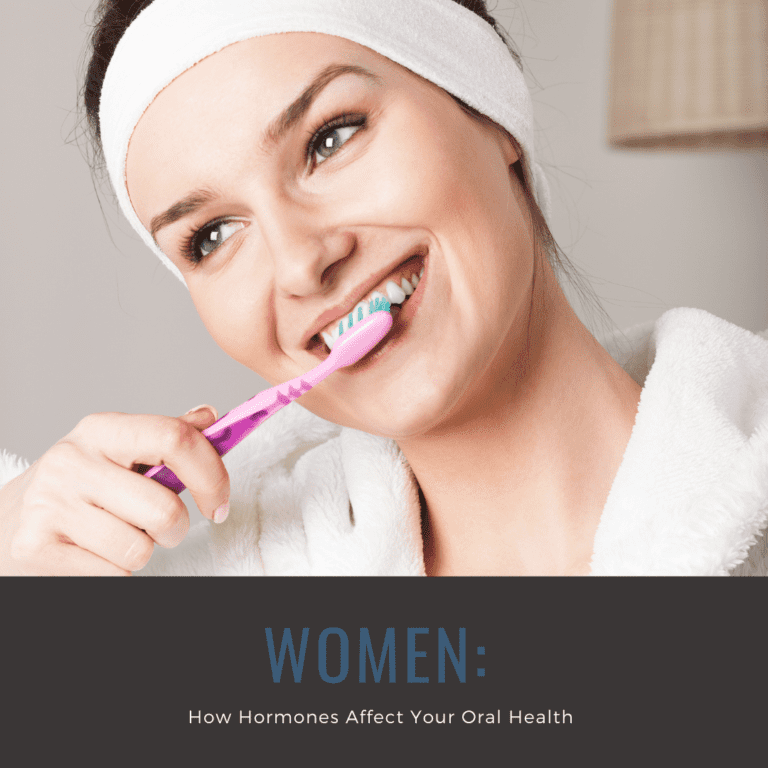Women: How Hormones Affect Your Oral Health

Women, did you know that your oral health may be at an increased risk during certain moments in your life? In honor of National Women’s Health Week (May 9th-15th), Bethesda Family Dentistry thinks it is important to educate women on how their oral health can be impacted by their hormones. Since hormones affect your oral health and your oral health affects your overall health, it is our hope that learning more about the relationship between your hormones and oral health can help you live a healthier life.
For starters, we need to take a look at what hormones are and what they do for the body. In the simplest sense, hormones are chemical messengers produced by the body to initiate certain functions. There are a variety of different hormones that regulate multiple functions within the body and affect your overall health. Even though men and women have the same hormones, they have different levels of these hormones that affect their bodies differently.
Women, in particular, have higher levels of estrogen and progesterone. While estrogen and progesterone are primarily used by the body to maintain a woman’s reproductive system, these hormones also directly affect the gums. When estrogen and progesterone levels rise, this increases blood flow to the gums, which makes them more sensitive. This increased sensitivity can cause the gum tissue to over react to plaque and bacteria, causing red, swollen gums that bleed easily. This can happen at various points during a woman’s lifetime, including:

Puberty
The first time this happens, is during puberty. During puberty estrogen begins to be produced by the hypothalamus. In response to the estrogen levels, the gums may become red, swollen and tender. In some cases women may also develop canker sores in response to increased estrogen levels. During this time, it is important to practice good oral hygiene by brushing twice a day and flossing once a day. Decreasing the amount of plaque will help to manage sore gums.
During Periods
Every month right before a woman’s menstrual cycle, estrogen and progesterone levels rise. Once again, this can cause the gums to become highly sensitive, swollen, and red. It may also cause the gums to bleed easier and can cause canker sores to form. Generally these symptoms will begin in the days leading up to your period, then they will disappear once your period ends.
While on Birth Control
Birth control can also have a minor effect on your oral health. Although the levels of progesterone and estrogen are too low to affect your gum tissue, birth control can increase the risk of developing a dry socket after a tooth extraction. It is also important to tell your dentist if you are taking birth control, because this can interfere with different antibiotics that may need to be prescribed.

During Pregnancy
A woman’s body undergoes several changes during pregnancy. Among these is the increased levels of estrogen and progesterone. In fact, a woman produces more estrogen during the single pregnancy than she will in her entire non-pregnant lifetime. Due to such high levels of estrogen, many women develop pregnancy gingivitis, which is characterized by red swollen tender gums that bleed easily. During pregnancy, it is important to see your dentist regularly for preventative cleaning. This is because gum disease has been associated with pregnancy complications such as preeclampsia, premature birth, and low birth weight.
Menopause
Estrogen levels rise during most points in a woman’s lifetime, once she has entered menopause they take a sudden drop. Unfortunately, this drop in estrogen also can affect your oral health. Although a drop in estrogen can cause you to feel Burning Sensations in your mouth and experience altered taste, the most problematic symptoms are dry mouth and bone loss. Dry mouth occurs when there is a reduced production of saliva, meaning that your teeth are at a higher risk of decay. Bone loss also occurs as a result of lower estrogen levels, and can be exacerbated by severe gum disease. For these reasons, it is important to maintain good oral hygiene and visit your dentist regularly for exams and cleanings.






Recent Comments